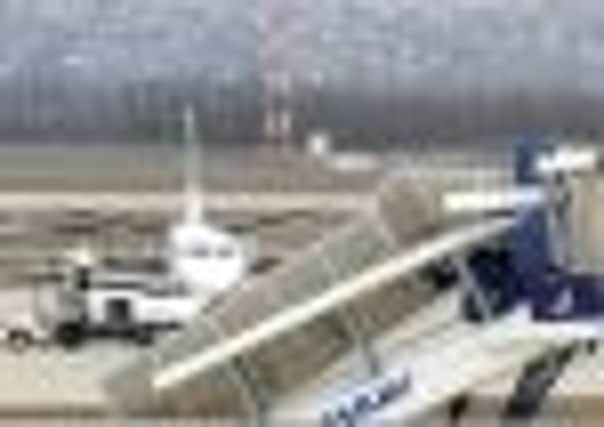Collapse of Hungarian airline fuels fears of European chaos


Malev announced it was to close at 5am on Friday after nearly 66 years in business and cancelled all flights – leaving 7,200 passengers stranded.
The news came a week after Catalan carrier Spanair also collapsed, affecting more than 20,000 travellers.
Advertisement
Hide AdAdvertisement
Hide AdBoth airlines fell victim to austerity measures as European governments battle with financial problems amid the eurozone economic crisis.
Travel analysts warned the closure could be the tip of the iceberg – with a number of airlines, particularly those in central and eastern Europe, which remain in state ownership – most at risk.
Passengers with tickets for flights operated by the airline – which runs a number of routes from Hungary to London and also acts as a hub for connections to destinations throughout Europe, the US and the Middle East – were being offered cut-price “rescue” fares from low-cost airlines including Hungarian carrier Wizz, which stepped in to shuttle the stranded home. It is believed Malev had been selling tickets as late as Thursday.
The airline said it was working with the government and other carriers to accommodate passengers’ holding future tickets for the carrier.
Budget airline Ryanair quickly unveiled plans for a new base at Budapest’s Ferihegy airport, where it will take on 31 new routes in two weeks’ time, including flights to London’s Stansted airport and Manchester.
But airline analyst John Strickland, of JLS Consulting, said Malev may not be the last airline to collapse. Its failure came after the airline was ordered by the European Commission last month to repay millions of pounds worth of state aid received between 2007 and 2010.
“There are quite a few which are struggling at the moment,” said Strickland. “Scandanavian Airways has already admitted an impact in their financial results this week from the collapse of Spanair as they were a shareholder – while most of the airlines in the former Communist countries are state owned.
“I don’t think we are going to see the same effect for UK holidaymakers as we did a few years ago with the closure of XL Leisure Group and so on,” he added. “But it is a market which has become a lot more difficult in terms of economic dynamics.”
Advertisement
Hide AdAdvertisement
Hide AdLaurie Price, head of aviation strategy at Mott Macdonald, warned that passengers holding Malev tickets could have to cover the cost of their cancelled flights.
“The issue for consumers is that unless they were flying as part of an inclusive tour package or booked by credit card, they may not be covered,” he said. He claimed consolidation could also lead to higher prices in future. “We have taken out two European airlines in a week – one which flew to a sun-spot area and the other to a renowned lakes and mountains holiday destination,” he said. “Ryanair has stepped in to cover Malev routes, but I have never known [chief executive] Michael O’Leary to give anything away – he will set the price according to competition, he is a businessman.”
An Association of British Travel Agents spokeswoman said airline insolvencies in Europe affected two million people in the past decade, most of whom were not protected, at an average cost of £800. She added: “Passengers who booked directly with the airline will not be protected or entitled to repatriation.”